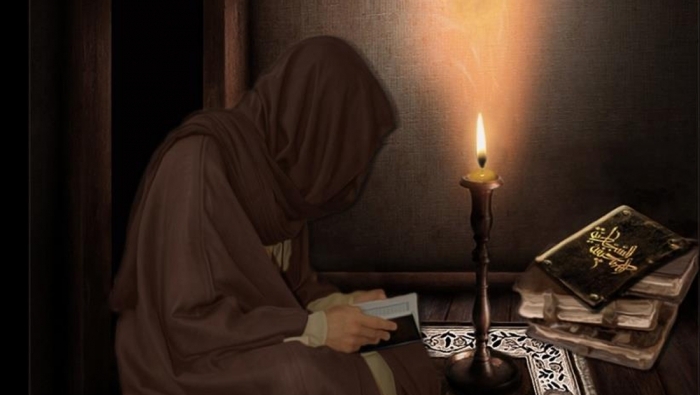What did Christian intellectual figures say about Imam Ali, may God bless his face? (3)
Ibrahim al-Yaziji.
Ibrahim al-Yaziji was an Arab philologist, critic, poet, and journalist. He belonged to the Greek Catholic population of the Mutasarrifate of Mount Lebanon. Yaziji’s family
is originally from Homs and it moved before he was born in Beirut. His works include The Necklace: A Book of Verse; Fine Examples of High Oratory, and Naj‘at al-Rai’d [5, p. 1058]. Abdul Masih Antioch refers to the words of al-Yaziji, as a great writer and linguist of the 20th century, on Nahj al-Balagha:
I was not well-versed in Arabic writing, I came near maturity and satisfaction only after I had studied the Holy Quran and Nahj al-Balagha, what students should recognize and cherish as two eternal treasures and resources that never expire. It’s impossible for a student to be skilled and proficient in style without burning many a midnight oil to study these two invaluable sources, a secure and sure response to the demands of any inquirer. [9, p. 700]
Suleiman al-Katani.
Suleiman al-Katani is a Lebanese contemporary writer. His works include “Prophet Muhammad, Imam Ali, Fatemeh Az-Zahra, Imam Hassan, Gibran Khalil Gibran”
[20, p. 193]. Al-Katani’s work, Imam Ali, has been recognized as a distinguished book by the religious authorities and scholars of Najaf Seminary. Here, al-Katani refers to Nahj al-Balagha by saying that:
This book has been authored by such a mighty pen that is right in form and worthy in content. Its style reflects a fitting garment of stature and originality in meaning, for in
rhetoric and power of meaning, this text is actually landing a great meaning in an upright and stable form. [21, p. 214]
Sobhi Saleh.
Sobhi Saleh is a contemporary researcher and scholar of Lebanon. He has a valuable work in the field of Arabic language and literature. He has published Nahj al-Balagha
along with his research and description. In the introduction, by citing examples of Imam Ali’s speeches in different topics, he expresses his wonder and admiration at Nahj al-Balagha. He writes about the progressive wisdom of Nahj al-Balagha:
If we put aside the sermons and letters of Imam Ali and go on to selections of his
wisdom, we realize that the miraculous and convincing sense of Imam Ali, reveals vast
knowledge, right experience, and deep understanding of reality and truth. [22, p. 15]
He speaks of the structure of Imam Ali’s arguments and the value of the Holy Quran and Prophet Muhammad’s tradition:
Undoubtedly Quranic wisdom and tradition have helped him with an eternal spring and fountain of truth. He structures his speeches and letters around the vivid visual style of the Holy Quran and the multiplicity of form and content in words and compounds derived from the Holy Quran and the Prophetic tradition. [22, p. 16]
George Jordac.
George Jordac was a Christian author and poet from Lebanon. He published
a book about Imam Ali entitled The Voice of Human Justice. Jordac was born in 1931 from an Orthodox Christian family. As a child, he read Nahj al-Balagha.
He learned about Nahj al-Balagha from his brother Fouad Jordac, an engineer, philologist, and poet. When he was 13 years old, George had memorized much of Nahj al-Balagha.
Jordac’s Imam Ali, The Voice of Human Justice is in five volumes: Imam Ali and Human Rights, Imam Ali and the French Revolution, Imam Ali and Socrates, Imam Ali and His Time, Imam Ali and the Arabs. Jordac, this renowned Christian Lebanese
thinker and author, profoundly loved the character and ideas of Imam Ali. Mr. Jordac
dedicated four decades of his life to study on a man whom he calls one of the greatest figures in the history of humankind, Imam Ali. Jordac earlier in an interview says that
he hopes the next generations would ponder on the treasures that lie in the rhetoric of
great men especially Imam Ali. George Jordac further says that he has always believed that the status of Imam Ali is above the historical or political-frameworks. In Jordac’s view, if the world’s intellectuals and authors just study Nahj al-Balagha and understand its concepts, masterpieces will be fashioned about him, but the Arabic and Islamic world have restricted the study of his character, a character which Jordac believes is that of a great reformist leader. But Imam Ali’s valiance and great intelligence has left a profound impact on all terms in Nahj al-Balagha in the good sense of a live, strong, broad, and deep intelligence that is open to all serious and deep contemplation. Ali’s scope of thought and expression is so vast and boundless that it leaves little space for negligence and disregard. Imam Ali has plunged in the deepest humanitarian matters and has turned upside down the most complex principles and in the field of speech has displayed and received the most hidden mysteries thus delving into the depth of life mysteries and secrets. Based on this rare and unique Alavid privilege, a logical consistency is evident in Imam Ali’s words and hence articulates the unified and natural result of the chain of cause and effect as in perception and expression, for the Imam’s thoughts have tied one argument to another both in form and content, and there exists an organic unity and cohesion in the totality of his works. Thus each and every term in Imam Ali’s thought and speech opens new horizons that are windows wide open unto many a horizon beyond. [23, p. 142-144]
Nursisian.
Allameh al-Shahrestani in his valuable book, On Nahj al-Balagha, writes:
In 1907, Nursisian, chief of British secretaries in the Consulate in Baghdad, who was an accomplished man, while talking to him spoke and expressed his opinion saying that Nahj al-Balagha is superior to any other principally human word in Arabic, because it presents the most intricate, delicate concepts and rhyming words of prose with little artificiality, something only to be witnessed in this book. Then, to establish his theory, he cites examples. The following lines are from Imam Ali’s sermon on the creation of man in “Nahj al-Balagha, namely, Sermon 83: Don’t I describe to you how God created this creation? God in the darkness of the womb and the interior of veils and curtains, created man from spilled semen, and a insignificant blood clot, then the infant came, and it was weaned, then reached maturity. Then man was given a bearing heart, a speaking tongue, a perceiving eye. Nursisian read the words and was surprised at the greatness of the rhymes and refrains that like water flow in Imam Ali’s words. He said if today this great speaker were on the pulpit in Kufa, you Muslims would verily see that the Mosque of Kufa with all its vastness would be crowded by a full community of western people who had come to plunge in the roaring seas of Imam Ali’s thoughts and words. [18, p. 42-43]
Mr. Krnykoy.
Allameh al-Shahrestani, in the book Ultimate Purification, in the second part, draws on the words of western scientists to bear witness to the all-encompassing majesty of the Quran and speaks of Mr. Krnykoy, an English literature professor at the Indian university of Aligarh, as a mentor and a speech master and scholar present in the house, whom upon being asked about the miracle of the Quran had said,
Nahj al-Balagha is the junior brother of the Holy Quran, wondering whether it were
possible for anyone to bring the like of this junior brother which brings us the unique
opportunity to wisely ponder its senior brother, the Holy Quran. [18, p. 16]
Raymond Qasis.
Raymond Qasis is a contemporary Lebanese Christian poet. Qasis retains a background of enthusiasm for composing poems on Muslim Imams. One of these writings is a book on the appraisal of Imam Ali and Nahj al-Balagha, which is the compilation of Imam Ali’s speeches, advices, and letters, and a Shia reference book. His works include The Story of the Goddess, A Poet’s Papers, Imam Ali: The Wise Jurist and Knight, and Imam Hussain’s Convoy. In his long poem, Imam Ali: The Wise Jurist and Knight, Qasis appraised and described various aspects of Imam Ali’s accomplishments and personality. He says, “Nahj al-Balagha is the brightest beacon that gives light to any aspiring poet;” Qasis further notes, “Nahj al-Balagha is full of
innovation and novel content and that Imam Ali’s word is beyond the word of Sohban bin Vael, the famous pre-Islamic Arabic man of eloquent,” and one of the issues that attracts the attention of Qasis is Imam Ali’s letter to Malik. He says, “Although all the letters fascinate me, but this one is exceptional. I believe that this letter communicates divine law as if fragrant musk and basil were running on Imam Ali’s truth-speaking tongue,” as he believes “If present and future men of power and influence follow the guidelines of this illuminating letter as an operational action plan, no soul would ever have to witness all the calamity afflicting mankind.” [24, p. 56]
Joseph Hashim.
Joseph Hashim is a poet, scholar, and former minister of Lebanon, who was engaged in journalism and teaching. Hashim’s poetry includes A Stone on Rocks, Light from Light, The Good Breeze. His other works include The Voice of Lebanon in the Two Year War, Al-Farabi, Suleiman al-Bustani and the Iliad [7, p. 296].
He wrote a lot of poems about Ahl al-Bayt, and he spoke in various articles and books about the Shia and specially Nahj al-Balagha. He remarks:
Whoever studies Nahj al-Balagha and studies it, they will see the signs of Allah as this book contains and displays all the necessities of connecting heaven and earth, all ties and relations required to create a bond between a servant and their creator, and all
instruments needed for the perfection of mankind. The general theme of this book is not directed at a specific religion, but it is a comprehensive work that addresses all men while speaking with them. Thus, Nahj al-Balagha can be used as a common book on interfaith dialogue between Islam and Christianity for the presence of such concepts in it as God, creation, this world, the hereafter, man, heaven, hell, and virtue all as absolute concepts without any narrow religious identity. [25, p. 103]
Joseph has written numerous poems to appraise and describe Imam Ali, in one of these poems he writes:
The sayings and words of Imam Ali are a fragrance of his mind, / And his sermons are illustrative of his thoughtful essence, / He refers to divine virtues and commands, / All in the most appealing literary form and sense, / All other books should ask for sense and knowledge, / And curing rain from his guidance light. (http://poets.setayeshgar.ir/)
Fouad Afram al-Bustani.
Professor Fouad Afram is a literary scholar, historian of Arabic civilization and literature, and an archaeologist. Al-Bustani was editor of the Arabic Encyclopedia (six volumes, 1956-66). He was the founder and first president and rector of the National University of Lebanon (until 1971). Al-Bustani’s works include The History of Education in Lebanon 100 Years Ago and With Gibran Khalil Gibran. He has reviewed the style of Ali’s words and cited some example of them in the first volume of Al-Raw’i‘i. He knows Nahj al-Balagha as the peak of Arabic rhetoric and says that:
Imam Ali delivered sermons during the tumultuous events of his life and preached and wrote letters, and these are all a remarkable collection of wisdom, advice, rules,
sermons, and prayers. Ali’s letters display deep thought, precise measurement, and eloquence in expression. Nahj al-Balagha stands at the peak of Arabic writing. Sharif ar-Razi has rightly called it Nahj al-Balagha. [26, p. 296]
Antoine Bara.
Antoine Bara, in his book called al-Hussain in Christian Thought, compares each of Imam Ali and Mu‘awiya’s words to their own children. He speaks of the valuable moral and educating will and advice of Imam Ali to Imam Hussain, Seyyed al Shohada, saying that:
This will contains all the moral, social, and religious principles of life as a guidance for Imam Hussain to head and steadily advance toward the right path thus aiding the oppressed. How can one ever compare this blessed will to the words of Mu‘awiya’s to his son, Yazid? [27, p. 151]
Raji Anwar Haifa.
Raji Anwar Haifa is a Lebanese contemporary writer who has written several books and articles about Ahl al-Bayt. The most important of his works is Imam Ali in
Contemporary Christian Thought, The Tragedy of Karbala in Modern World Conscience. It is worth noting that the book met great welcome and won a Gold Award from Ahl al-Bayt Foundation for Cultural Revival Institute. In the first book, Haifa has devoted a chapter to Imam Ali’s linguistic knowledge and his rhetorical genius where he says that:
Nahj al-Balagha is a mirror of linguistic knowledge and the holy Quran, the attainment of whose high eloquence, rhetoric and content is beyond the reach of other scholars and speakers. Many Christian thinkers and writers know it as an immortal book unreproducible by other men of knowledge, speech, and rhetoric. [28, p. 550]
Nasri Salhab.
Nasri Salhab is another contemporary Christian thinker and scholar of the Arab world. His numerous works include In the Footsteps of Christ, In the Footsteps of Muhammad, and In the Footsteps of Imam Ali. This Christian thinker refers to the eloquence and linguistic authority of Imam Ali. He believes that:
Imam Ali has achieved this linguistic knowledge and rhetorical genius in two ways: first through interrelating his holy spirited words and letters with the unique expression of the Holy Quran as revealed in this divine script, and second through Prophet Mohammad. [28, p. 557-558]
According to professor Salhab:
As each craftsman is represented by their art and each scientist is marked by their science, the collected sermons and speeches in Nahj al-Balagha clearly show that Imam Ali is the spiritual father of rhetoricians in the Arabic Language. [28, p. 558]
He writes about the Motaqin or Pious sermon and its spiritual and eloquent language stating that:
If anyone who reads this sermon wants to choose its most beautiful and highest peaks, they would be left in astonishment and after a while they would have to adopt all of it. Thus he would recommend all Christian believers turn to Nahj al-Balagha and read it carefully. [25, p. 100-101]
Lewis Ma‘luf.
Lewis Ma‘luf is a contemporary Lebanese writer and linguist. He achieved widespread fame, due to writing the famous al-Monjid dictionary. He, in al-Monjid, refers to Nahj al-Balagha, as a collection of Imam Ali’s word, and says, “Imam Ali is the founder of the first school of Islam from which extensive cultural, high currents and tides flow.” [29, p. 378]





